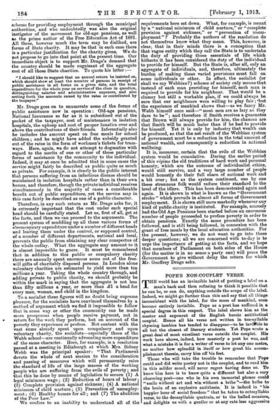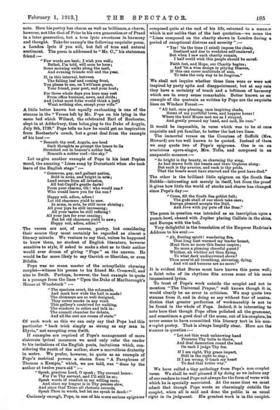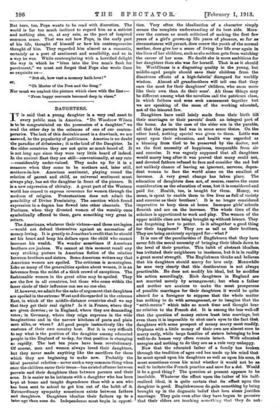POPE'S NON-COUPLET VERSE.
Those who will take the trouble to remember that Pope could and did write poetry not in the couplet, and to read him in this milder mood, will never regret having done so. To know him here is to know quite a different but also a very charming poet—one who in his own immortal phrase could " smile without art and win without a bribe "—the bribe to the brain of an explosive antithesis. It is indeed in " his happier hour of social freedom " that he takes to octosyllabie verse; to the decasyllabie quatrain, or to the ballad measure, and delights us with a gentler or at any rate less aggressive
note. Here his poetry has charm as well as brilliance, a charm, however, not like that of Prior in his own generation or of Praed
in a later generation, but a true lyric sweetness in harmony and thought. Take for examp'e the following exquisite poem, a London lyric if you will, but full of true and natural sentiment. The poem is addressed to "Mr. C.," his statesman
friend :—
" Few words are best; I wish you well; Bethel, I'm told, will soon be here; Some morning walks along the mall, And evening friends will end the year.
If, in this interval, between
The falling leaf and coming frost, You please to see, on I wit'nam green, Your friend, your poet, and your host;
For three whole days you here may rest From office business, news, and strife ; And (what most folks would think a jest) Want nothing else, except your wife."
A little better known but equally enchanting is one of the stanzas in the "Verses left by Mr. Pape on his lying in the same bed which Wilmot, the celebrated Earl of Rochester, slept in at Adderbury, then belonging to the Duke of Argyle, July 9th, 1739." Pope tells us how he could get no inspiration
from Rochester's couch, but a great deal from the example
of his host:— "Beneath thy roof, Argyle, are bred
Such thoughts as prompt the brave to lie Stretched out in honour's nobler bed, Beneath a nobler roof—the sky."
Let us give another example of Pope in his least Popian mood, the amazing " Linea sung by Durastanti when she took
leave of the English stage" :-
"Generous, gay, and gallant nation, Bold in arms, and bright in arts ; Land secure from all invasion,
All but Cupid's gentle darts!
From your charms, Oh ! who would run? Who -would leave you for the sun ?
Happy soil. adieu, adieu!
Let old charmers yield to new.
In arms, in arts, be still more shining ; All your joys be still increasing; All your tastes be still refining !
All your jars for ever ceasing;
But let old charmers yield to new ;
Happy soil, adieu, adieu!"
The verses are not, of course, poetry, but considering their source they must certainly be regarded as almost a literary miracle. We venture to say that, unless he happened to know them, no student of English literature, however
sensitive to style, if asked to make a shot as to their author would ever dream of giving "Pope" as the answer. He would be far more likely to say Garrick or Sheridan, or even
Dibdin.
Pope was no mean master of the octosyllabio rhyming couplet—witness his poems to his friend Mr. Cromwell, and
also to Swift. Perhaps, however, the best example to quote is a passage from the lines " Upon the Duke of Marlborough's House at Woodstock " :- " The spacious court, the colonnade, And mark how wide the hall is made ! The chimneys are so well designed, They never smoke in any wind. This gallery's contrived for walking, The windows to retire and talk in: The council chamber for debate, And all the rest are rooms of state."
Of such work as this we can only say that Pope had this particular " back trick simply as strong as any man in Illyria," not excepting even Swift.
If examples are required of Pope's management of more elaborate lyrical measures we need only refer the reader to his imitations of the English poets, imitations which, con- sidering the youth of the author, show a marvellous dexterity in metre. We prefer, however, to quote as an example of Pope's metrical powers a stanza from " A Paraphrase of Thomas a Kempis," which, we are told, was " done by the author at twelve years old " :-
" Speak, gracious Lord, 0 speak ; Thy servant hears:
For I'm Thy servant, and I'll still be so; Speak words of comfort in my willing ears; And since my tongue is in Thy praises slow, And since that Thine all rhetoric exceeds, Speak Thou in words, but let me speak in deeds ! "
Curiously enough, Pope, in one of his more serious epigrams
composed quite at the end of his life, returned to a mann.m. which is not unlike that of the last quotation—we mean the "Lines composed on the charity shown in London during a period of exceptional distress and severity " :—
" Yes! 'tis the time (I cried) impose the chain, Destined and due to wretches self-enslaved; But when I saw such charity remain,
I half could wish this people should be saved.
Faith lost, and Hope, our Charity begins ;
And 'tis a wise design in pitying Heaven, If this can cover multitude of sins, To take the only way to be forgiven."
We shall not inquire whether these lines were or were not inspired by party spite and disappointment, but at any rate they have a certainty of touch and a loftiness of harmony which are in every sense remarkable. Better known as an example of the quatrain as written by Pope are the exquisite lines on Windsor Forest:—
" All hail, ones pleasing, once inspiring shade, Scene of my youthful loves, and happier hours ! Where the kind Muses met me as I strayed, And gently pressed my hand, and said, Be ours."
It would be impossible, in verse which was to be at once exquisite and yet familiar, to better the last two lines.
The immortal verses on the Countess of Suffolk (Mrs. Howard) are too well known to be quoted. Instead of them we may quote two of Pope's epigrams. One is on an avaricious opera-singer, Mrs. Tofte, and composed in an anapaestic measure :-
" So bright is thy beauty, so charming thy song,
As had drawn both the beasts and their Orpheus along: But such is thy avarice, and such is thy pride, That the beasts must have starved and the poet have died."
The other is the brilliant little epigram on the South Sea Bubble—interesting not merely in itself, but from the proof it gives how little the world of stocks and shares has changed since Pope's day :— "Come, fill the South Sea goblet full; The gods shall of our stock take care ; Europa pleased accepts the Bull,
And Jove with joy puts off the Bear."
The poem in question was intended as an inscription upon a punch-bowl, chased with Jupiter placing Carnet° in the skies, and Europa with the bull.
Very delightful is the translation of the Emperor Hadrian.
Address to his soul :—
" Ah, fleeting spirit ! wandering fire, That long host warmed my tender breast, Must thou no more this frame inspire ; No more a pleasing cheerful guest?
Whither. ah whither art thou flying, To what dark undiscovered shore ?
Thou seem'st all trembling, shivering, dying, And wit and humour are no more!"
It is evident that Burns must have known this poem well ;
a faint echo of its rhythms flits across some of his most impassioned lyrics.
To treat of Pope's work outside the couplet and not to mention "The Universal Prayer," well known though it is, would clearly be an error in criticism. We may quote two stanzas from it, and in doing so say without fear of contra- diction that greater perfection of workmanship is not to be found in the whole of Pope. Indeed, it is interesting to note here that though Pope often polished all the grammar, and sometimes a good deal of the sense, out of his couplets, he never seems to have committed this literary tort in his non-
eDuplet poetry. That is always limpidly clear. Here are the stanzas in question :— " Let not this weak unknowing hand Presume Thy bolts to throw,
And deal damnation round the land On each I judge Thy foe.
If I am right, Thy grace impart, Still in the right to stay ; If I am wrong, 0 teach my heart To find that better way."
We have culled a tiny anthology from Pope's non-couplet verse. We shall be well pleased if by doing so we induce any of our readers to read Pope not always for the form of verse with which he is specially associated. At the same time we must
admit that though Pope wrote so charmingly outside the couplet, when all is said and done the public is as usual
right in its judgment. His greatest work is in the couplet.
But here, too, Pope wants to be read with discretion. The world is far too much inclined to regard him as a satirist and nothing else, or, at any rate, as the poet of inspired common sense. That was not how Pope, in the early part of his life, thought of himself or bow his contemporaries thought of him. They regarded him almost as a romantic, certainly as a poet of sentiment and sensibility, and so in a way he was. While contemplating with a horrified delight the way in which he "bites into the live man's flesh for parchment," we must not forget that Pope also wrote lines so exquisite as- " Bnt ah, how vast a memory hath love !"
or, "Oh Master of the Poet and the Song."
Nor must we neglect the picture which rises with the line :— "From happy convents bosomed deep in vines."












































 Previous page
Previous page